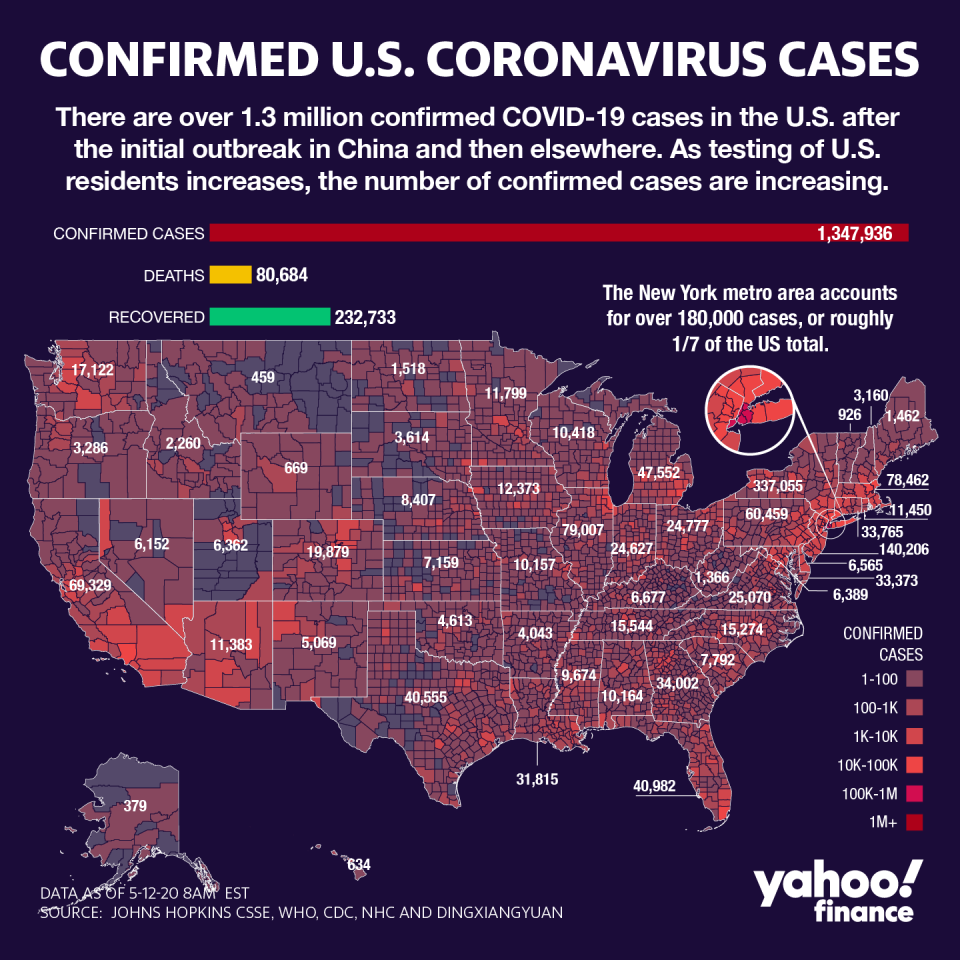Coronavirus update: Fauci warns on reopening risks, says outbreak 'not under control'
Anthony Fauci, director of the National Institute of Allergy and Infectious Diseases, told the U.S. Senate on Tuesday that the U.S. was still lagging in its response to the coronavirus pandemic, as he reiterated a dire warning that the fall could bring a new wave of infections that have brought the global economy to standstill.
Fauci spoke during a Senate hearing Tuesday, and was one of several White House coronavirus task force members to be questioned by senators about the U.S. response to the outbreak. CDC director Robert Redfield, FDA Commissioner Steven Hahn and HHS’s Adm. Brett Giroir were also virtually present.
The widely respected physician told senators that the U.S. needs to be prepared should the COVID-19 crisis resurface later this year, even as infections show signs of leveling off nationally. He also tempered expectations that efforts to develop a vaccine would bear immediate fruit.
“We do not have it under control,” Fauci told lawmakers in testimony, characterizing a new coronavirus surge as “inevitable.”
He added that while some of the largest hotspots are on the decline, “we are seeing spikes in other parts of the country,” and the country needs to take control in order to have time to prepare for the fall and winter.
And despite a best-case scenario that a COVID inoculation candidate could be ready by September, a vaccine is unlikely to be ready by the time school begins again in the fall, Fauci added.

The global pandemic has now affected more than 4.2 million and the death toll has surpassed 288,000. In the U.S., more than 1.3 million have been infected and more than 81,000 have died, even as infections and hospitalizations in major clusters like New York and New Jersey begin to tail off.
Meanwhile, a new Centers for Disease Control (CDC) report indicates there could have been undercounting of deaths, a concern health experts had during the peak of the outbreak in New York City, as deaths outside a nursing home or hospital were not marked for COVID-19.
“The counting of confirmed and probable COVID-19–associated deaths might not include deaths among persons with SARS-CoV-2 infection who did not access diagnostic testing, tested falsely negative, or became infected after testing negative, died outside of a health care setting, or for whom COVID-19 was not suspected by a health care provider as a cause of death,” according to the report.
Fauci also addressed the issue on Tuesday, saying there are likely more COVID-19 deaths than have been counted. The accuracy of deaths and infection numbers underscores why rigorous testing is perceived as a critical component of the U.S.’s plans for economic revival.
Yet Brian Gragnolati, Atlantic Health System CEO & President and Former American Hospital Association Chair, told Yahoo Finance in an interview that “testing was is a problem, testing remains a problem, and if we don’t get it right it will be a big problem as we try to bring this economy to life.” He echoed others who say U.S. testing efforts, while on the rise, aren’t where they need to be as states relax their lockdowns.
Meanwhile, some areas are seeing a resurgence in cases, after easing public restrictions. In China, ground zero for the global outbreak, Wuhan is ramping up testing for all its residents following a new spike in cases.
Remdesivir rollout
The Trump administration’s handling of the distribution of more than 600,000 doses of Gilead’s (GILD) breakthrough treatment drug, remdesivir, was thrown into question late last week.
Some health providers questioned where their share of the authorized treatment was amid reports of the opaque and confusing distribution — leading to Dr. Deborah Birx, coordinator of the White House task force, to be tasked with leading the effort. Meanwhile, the U.S. Health and Human Services Department (HHS) said states will prioritize who will receive the drug.
In a statement over the weekend, HHS said that an initial distribution of the donated doses from Gilead have gone to at least seven states, with the largest amount of doses going to hard-hit New York and New Jersey.
Vials that will be distributed over the next six weeks to treat an estimated 78,000 hospitalized patients are a portion of the 1.5 million vials the company is donating worldwide.
Anjalee Khemlani is a reporter at Yahoo Finance. Follow her on Twitter: @AnjKhem
[Click here for more of Yahoo Finance’s coronavirus coverage: Personal finance tips, news, policy, graphics & more from Yahoo Finance]
Follow Yahoo Finance on Twitter, Facebook, Instagram, Flipboard, LinkedIn, and reddit.
Find live stock market quotes and the latest business and finance news.
